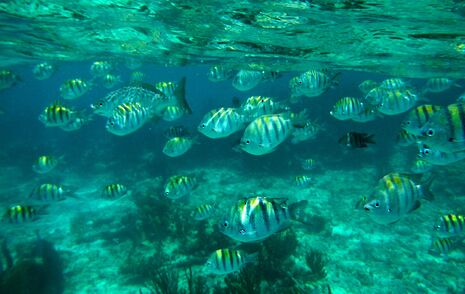Anxieties as fish swap genders
Fish “feminisation” may be due to oestrogen in the ocean from the Pill

A Cambridge academic is delving further into our fascination with gender-switching fish, a phenomenon linked to the chemical pollution of waterways and thus the habitats in which they live.
Dr Janelle Lamoreaux, who is based in the Department of Sociology at the University of Cambridge, is researching why fish changing gender appears to evoke such anxiety in wider society.
Her research is based upon work by the Ecotoxicology and Aquatic Biology Research Group at the University of Exeter.
The group’s research discovered that chemicals released into rivers have started to induce female characteristics in male fish.
The contraceptive pill is just one of several pollutants thought to be linked to fish feminisation.
Endocrine disrupting chemicals mimic naturally occurring oestrogens and can change the hormonal balance in fish. If exposed to oestrogen for long enough, male fish can develop the ability to breed as females.
Dr Lamoreaux, who recently presented her research at St John’s College, cites a variety of reasons for public concern surrounding fish feminisation.
Worries that sexually disrupting chemicals may build up in the food chain are widesprad amongst environmental groups.
“There seems to be a fear that what happens to fish might also happen to humans because they consume the same toxins,” she told the room at St John’s.
Gender switching fish also highlight the extent to which humans influence the environment we live in. Tom Elliot, a third year Geography student, commented that it’s “scary how much impact we have had on the natural world. Who knows what effect we’ve had on other aspects of our environment.”
Dr Lamoreaux also pointed out that the unsettling nature of fish feminisation can in many ways be explained by deeper and more social causes. It “exposes contemporary anxieties about human gender identities”.
Ideas about gender roles and what it means to be masculine and feminine in modern society are threatened by the seemingly unstable nature of gender in fish.
She further suggested that “anxieties about the threat of feminisation in fish are shaped by lingering negative attitudes towards men and women who transgress normative gender roles.”
Dr Lamoreaux argues that the issue needs to be approached without “drowning in anti-feminine ideals of masculinity that currently underlie scientific vocabularies”.
 News / Copycat don caught again19 April 2024
News / Copycat don caught again19 April 2024 Theatre / The closest Cambridge comes to a Drama degree 19 April 2024
Theatre / The closest Cambridge comes to a Drama degree 19 April 2024 Interviews / ‘People just walk away’: the sense of exclusion felt by foundation year students19 April 2024
Interviews / ‘People just walk away’: the sense of exclusion felt by foundation year students19 April 2024 News / AMES Faculty accused of ‘toxicity’ as dropout and transfer rates remain high 19 April 2024
News / AMES Faculty accused of ‘toxicity’ as dropout and transfer rates remain high 19 April 2024 News / Acting vice-chancellor paid £234,000 for nine month stint19 April 2024
News / Acting vice-chancellor paid £234,000 for nine month stint19 April 2024




